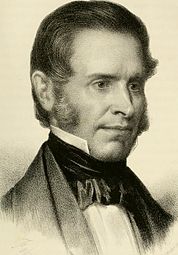Peleg Sprague (Maine politician)
| Peleg Sprague | |
|---|---|
 |
|
| Judge of the United States District Court for the District of Massachusetts | |
|
In office July 15, 1841 – March 13, 1865 |
|
| Appointed by | John Tyler |
| Preceded by | John Davis |
| Succeeded by | John Lowell |
| Member of the U.S. House of Representatives from Maine's 4th district |
|
|
In office March 4, 1825 – March 3, 1829 |
|
| Preceded by | Stephen Longfellow |
| Succeeded by | George Evans |
|
United States Senator from Maine |
|
|
In office March 4, 1829 – January 1, 1835 |
|
| Preceded by | John Chandler |
| Succeeded by | John Ruggles |
| Member of the Maine House of Representatives | |
|
In office 1821–1822 |
|
| Personal details | |
| Born | April 27, 1793 Duxbury, Massachusetts |
| Died | October 13, 1880 (aged 87) Boston, Massachusetts |
| Political party | National Republican |
| Alma mater | Harvard University |
Peleg Sprague (April 27, 1793 – October 13, 1880) was an American politician from the U.S. state of Maine, and a United States federal judge.
Born in Duxbury, Massachusetts, Sprague graduated from Harvard University in 1812, and studied law at the Litchfield Law School in Litchfield, Connecticut. He was admitted to the bar in August 1815 and began practice in Augusta, Maine. In 1817, he moved to Hallowell, where he continued his practice.
Sprague's political career began when he served as a member of the Maine House of Representatives from 1821 to 1822. In 1823, he was elected to the U.S. House of Representatives from Maine's fourth congressional district, serving from March 4, 1825, to March 3, 1829, when he became a member of the United States Senate. Sprague continued to serve in the Senate until January 1, 1835, when he again resigned. During his time in the Senate Sprague became a prominent campaigner against President Andrew Jackson's controversial policy of Indian removal, whereby Indians in the Southern states were to be forcibly relocated to West of the Mississippi River. Sprague argued that the policy was corrupt as it largely relied on bribes for support, and he also attacked the plan for its immorality and lack of humanity, claiming that the Indians would receive no assistance in starting new lives in an alien environment. After resigning from the Senate in 1835, Sprague practiced law in Boston from 1836 to 1841. He was a presidential elector on the Whig ticket in 1840.
...
Wikipedia
